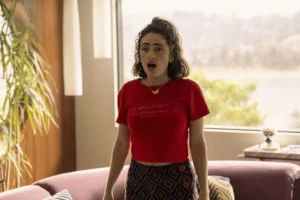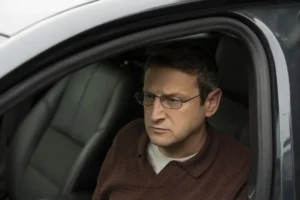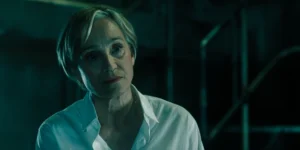The ending of Uprising is a full-circle experience: a former slave and master (and a misunderstood friendship spanning years) finally meet in a bloody battle on the beach. The end brings a salient message, but to understand the film’s context, there are many moving parts.
To help, I’ve put together key moments of Uprising into a story recap, along with my opinions, eventually leading to the ending.
The Premise That Noblemen and Slaves Should Be Equal
At the start of the Korean film, we are provided some insight into the background of the story:
“The Joseon Dynasty scholar Jeong Yeo-rip asserted that all people are equal, and should have no master. In a private community he formed the Great Unity, noblemen and slaves shared food and drink and practiced martial arts together.
Eventually accused of treason, he was besieged by government forces, and took his own life by putting a knife through his neck. This was under the reign of King Seongjo.”
The opening of Uprising details the struggle between slaves and their masters during the Joseon Dynasty. Movements such as the Great Unity drove the human demand for classes to be determined equally.
This leads to the introduction of Cheon-yeong, who is captured by Gwang-yi, a slave hunter, and brought to his former master, Yi Jong-ryeo.
The Background of Cheon-yeong and Yi Jong-ryeo
In the film’s flashbacks, it’s established that Cheon-yeong was a commoner, but despite the pleas from his father, he was assigned as a slave. The great shame led his father to commit suicide.
Yi Jong-ryeo was a master destined to be a leader in the military and resided with his father in the King’s palace.
Despite Cheon-yeong being a slave to Yi Jong-ryeo, they became close friends, and Cheon-yeong taught his master how to use the sword in preparation for his military examination.
However, Yi Jong-ryeo keeps failing the exam, so Cheon-yeong offers to take it (while pretending to be him), and in return, he’s promised by his friend’s father that he will have his slave papers returned and be liberated.
Despite Cheon-yeong passing Yi Jong-ryeo’s military exam, the promise is broken; the father believes it would be treason to the King to free him as a slave. And so, Cheon-yeong has to escape. Yi Jong-ryeo tells him to free slaves, and take down the barbarians. Before he leaves, he gives Cheon-yeong his sword.
The friendship between master and slave is the crux of Uprising, as the companionship they feel for each other is unspoken throughout the movie.
Of course, the misunderstandings and temporary, venomous hatred for each other developed over time, primarily due to the gap in class, and during the war with the Japanese, the commoners and slaves banded together to cause an uprising against the Dynasty. Yi Jong-ryeo’s family is killed, and due to an incorrect message passed on, he believes his wife and son were murdered by his former slave, Cheon-yeong.
Of course, the war ravages the country, and we are treated to a sublime sword fight between Cheon-yeong and Genshin Kikkawa, the Konishi Battalion’s frontline commander, that ends with no winner.
Forming A New Dynasty
Seven years later, the war is over. King Seongjo wants to rebuild the Palace in Hanyang rather than focus on the social make-up of the contract, which is on a knife-edge. He has opposition; Gwang-yi believes they should merit the people who helped them win the war first and raise the lowborn status of those who fought to win for the people.
However, as the film’s opening suggests, the King is not interested in bridging the gap between roles and classes.
Cheon-yeong is now with the Suncheon Base Camp of the Righteous Army (Volunteer Militia), led by General Kim Ja-ryeong.
Understandably, there is nervousness that the King will not liberate them despite their efforts in the war.
The Righteous Army faces another Japanese invasion but defeats them with ease, and the movie once again pits Cheon-yeong and Genshin Kikkawa (who is also named the “Nose Snatcher,” known for chopping people’s noses) against each other.
It’s clear what the film is doing here; it’s preparing for Cheon-yeong and Genshin Kikkawa to be the last fight, and praise has to be given for the fighting choreography.
The intention is for the Righteous Army to take captured Japanese prisoners to the King so they can negotiate and use them as bait, but Beom-dong is rightfully fearful and does not trust the government to impose laws whereby lowmen and nobles will live harmoniously, despite achievements.
So, Beom-dong forms her own faction, leaves the Righteous Army, and kills the Cheongju mayor.
(Of course, the killing of the mayor provides a turning point and a justification for King Seongjo not to do the right thing for his people and turn on General Kim Ja-ryeong’s followers).
By the time General Kim Ja-ryeong arrives in Hanyang, King Seongjo has already concluded that the General is behind the murder of the Cheongju mayor. The General and his people get a hero’s welcome, but they are soon accused of treason and killed. General Kim Ja-ryeong is executed.
Amongst the chaos, lifelong friends Cheon-yeong and Yi Jong-ryeo finally meet and engage in a sword fight.
(It’s worth noting that this moment provides a sense of euphoria for the viewer. You have to endure a lot of patience in the movie to reach this reunion, and it’s worth it).
During the fight, Cheon-yeong expresses that he feels betrayed by the King, just as he did by Yi Jong-ryeo’s father. The fight does not determine death or a winner, and Cheon-yeong has to be a recluse again, confirming himself as a traitor and running away.
Salient point, but Yi Jong-ryeo never confirmed his plans for revenge due to the “murder of his wife and son”; it becomes a great tragedy that he believes Cheon-yeong did that to his family.
Riots Against The King
The people of Joseon are unhappy about General Kim Ja-ryeong’s execution; he represents the people, but King Seongjo is disinterested and wants to find the hidden Japanese treasure. A revenge-filled Yi Jong-ryeo advises the King to bring the Japanese volunteer soldiers into government to quell the riots, which will help wipe out the rest of Kim Ja-ryeong’s followers.
Despite the objection, the King went ahead with the plans, and the former Japanese general Genshin Kikkawa was ordered to lead the unit of defective soldiers. Yi Jong-ryeo is appointed to the Investigation Bureau as Chief of Punitive Forces, and is tasked with bringing down the traitors.
Meanwhile, an exhausted Cheon-yeong returns to Beom-dong and the rest of Ja-ryeong’s followers and plans a revolt against the government. They figure out where the hidden treasure is, which causes a split in the camp: most want prosperity from the treasure rather than fighting the government officials. Cheon-yeong reminds them that they’ll be chased for the rest of their lives, but his words fall on deaf ears, and Ja-ryeong’s followers leave him and Beom-dong behind.
Uprising brings a lot of context to historical wars regarding how factions are created and how revolutions die and resurface, evolving into different objectives. Meanwhile, the King is stuck in the past, trying to maintain the status quo despite the changing social construct of society.
The Ending of Uprising Brings A Compelling Three-Way Fight Between Yi Jong-ryeo, Cheon-Yeong, and Genshin Kikkawa
The group that separated from Cheon-yeong and Beom-dong is ambushed by Yi Jong-ryeo’s soldiers, and he leaves a message for his old friend.
Then, Yi Jong-ryeo turns on the defected Japanese army on a foggy beach; it is interesting that it is foggy, representing blurry lines that have caused misconceptions between Yi Jong-ryeo and Cheon-yeong.
As Yi Jong-ryeo’s soldiers fire to execute the defective Japanese army, their rifles turn on them because the maintenance of the guns is still on. It becomes a bloody battle on the foggy beach, and Yi Jong-ryeo faces Genshin Kikkawa for the first time. The Japanese General tells Yi Jong-ryeo that his fighting style is similar to Cheon-yeong, and the full-circle story experience comes to fruition.
Cheon-yeong joins in, making it a three-way fight, with all three men wanting to kill each other. Eventually, Yi Jong-ryeo expresses that he wants revenge on Cheon-yeong for killing his wife and son. Cheon-yeong’s face etches with confusion and he tells his old friend that he tried to save his wife and son, but she decided to jump into the flames with her son after calling him a “brute.”
Yi Jong-ryeo is in disbelief, and for a good reason; his years of wanting revenge were unfounded.
And the story becomes tragic as we reach the end of Uprising as Genshin Kikkawa brutally wounds Yi Jong-ryeo, making it a one-on-one battle between Cheon-yeong and Genshin Kikkawa.
Of course, it’s only fitting that Cheon-yeong defeats Genshin Kikkawa as he slices him apart with his sword.
Cheon-yeong runs over to the dying Yi Jong-ryeo and, in a sweet moment, tying the story together, asks if they are still friends. Yi Jong-ryeo dies in Cheon-yeong’s arms; a life of friendship they could have had, torn apart from the class system of the Joseon dynasty.
Meanwhile, King Seongjo is looking for Yi Jong-ryeo and the troops, who he believes have disappeared. A cargo is delivered to him. At first, he thinks it is the treasure, but when he opens it, they are filled with salt and chopped off noses.
A new community is formed – Cheon-yeong states that the “Great Unity” (explained at the start of the film) failed, but now they have become the “Pan-Unity,” highlighting the need for people to come together, regardless of background.
While the ending of Uprising demonstrates the strain of a lost friendship spanning many years, it also highlights how revolutions are formed when class systems are aggressively and violently implemented. The film’s conclusion brings hope and closure for Cheon-yeong, who eventually finds peace with his old friend.



